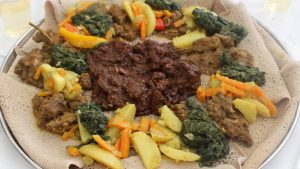
Traditional cuisine in Eritrea and Ethiopia is based on a staple sour dough pancake called Injera accompanied with sauce(s) called Tsebhi/Wet. Injera, most of the time, is made from an ancient grain called Teff (Eragrostis tef). Usually the process of making Injera takes approximately three to four days. The process starts by mixing water, teff flour and a starter mix. It is left to ferment for a few days before baking on a hot clay pan (Mogogo/Mitad*). Often, a portion enough to last for a few days is baked at a time, rather than only for immediate consumption. Sometimes excess Injera is dried in the sun and turned into crisp like pieces, called Koresho/Dirkosh* to preserve it for longer durations. Koresho/Dirkosh becomes soft when added into a freshly prepared traditional sauce and can thus be consumed just like fresh Injera.
Injera, is a carbohydrate base and thus always accompanied with a sauce (Tsebhi/wet*), of spicy vegetarian and or meat based dishes. Seasonal variations as well as religious observances mean the type of sauce/side dish consumed can vary. For example, during fasting period, families eat only vegetable based dishes. While during festive season more meat based dishes are cooked. Also during the wet summer months, vegetables are abundant, hence increasing their frequency during rainy season
The most common sources of meat used to prepare traditional dishes come from chicken, lamb and beef. Few examples of meat based sauces are like: Tsebhi Derho /Doro Wet* is one of the delicacies traditionally served during festive season and/or special occasions. Zigni is another delicacy of spiced meat. usually made with lamb or beef.,
Vegetarian dishes are very common. One favourite is Shiro. It is made with chickpea, peas and mixed with various spices. Often a supply of Shiro is made long in advance, hence during cooking only the shiro powder needs to be brought in. Lentil based dishes such as Timtimo/Misir Wet* is also quite popular. Often used vegetables include swiss chard, cabbage, spinach, kale, and Okra.. A very popular one is called Alicha/Yatkilt Alicha* It is a mix of carrot, French beans and potatoes.
Finally, what about spices? In traditional cuisine, Berbere is the king of spices. It is added to almost all dishes that call for some heat. Berbere is a concoction of chilli peppers and numerous spices such as Curum (ajwain) seeds, garlic, ginger, basil, korarima, fenugreek, nigella, among others.
.* A note on languages used. The blog often refers to the two most common languages in Eritrea/Ethiopia, i.e. Tigrigna and Amharic, mainly due to familiarity. However the blog unequivocally accepts and will use other languages whenever possible.
